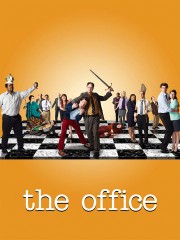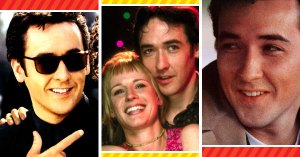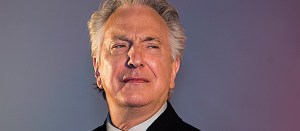Five Ways The Office Changed TV Forever
Fifteen years on, we're saluting one of TV's funniest workplace comedies for popularizing the mockumentary format, introducing a new era of stars, and teaching us to enjoy a good cringe.

(Photo by NBC)
It’s been 15 years since The Office first premiered on March 24, 2005. The notion of an American take on the Ricky Gervais–created UK series of the same name was a risk. But NBC was up for the challenge. Greg Daniels (creator of King of the Hill and former writer on The Simpsons) assembled a talented ensemble — Steve Carell, John Krasinski, Jenna Fischer, Mindy Kaling, Rainn Wilson, Ellie Kemper, and many more — to disrupt the world of TV sitcoms. The workplace comedy that put Scranton, Pennsylvania, on the map definitely endured a rocky start, along with the threat of cancellation, but it eventually found its footing and has since gone on to be considered a television great.
After nine seasons, the program came to an end on May 16, 2013. And yet, all these years later, The Office continues to be in high demand. As social distancing becomes our new norm, more-and-more viewers are looking for some small-screen comfort food, and The Office just keeps ticking all the boxes — it is all sort of poetic when you think of it.
With NBC’s plan to exclusively house the series on its new platform Peacock by year’s end, the game-changing sitcom continues to be one of Netflix’s most popular shows.
- Recommended: The 200 Best Comedy Series of All Time
Sure, the times and technology have definitely changed, but the program sidestepped addressing current events or politics, instead focusing on the cast of unique characters, a variety of oddball situations, and a surprisingly large amount of heartfelt drama. That winning combination has kept The Office relevant and relatable. Case in point: pop-music sensation Billie Eilish was just four-years-old when the series started airing on NBC, but she’s such a die-hard fan of the program (in 2019, the Grammy-winning singer admitted to watching the series 12 times, in its entirety) that she once stunned Office star Wilson with her trivia knowledge about the series.
In this cluttered television landscape, how has the show endured? Let’s take a closer look at the many ways The Office changed TV forever.
IT BROUGHT THE MOCKUMENTARY FORMAT FRONT-AND-CENTER

(Photo by NBC)
Up until fairly recently, the multi-camera format was the name of the game in the sitcom world. The Office changed all that. It wasn’t the first comedy to strip away the studio audience and live theater aesthetic, mind you. Shows like Scrubs, Arrested Development, and Reno 911! had already charted that territory. But the stripped-down format of the NBC series, along with the mundane nature of the Dunder Mifflin set, shed the Hollywood-ness of the production and brought the audience into the relatable on-the-job story in a way that hadn’t really happened in television since the early days of M*A*S*H.
The Office was, in its own story world, the result of a hardly-seen crew that was filming a documentary titled “The Office: An American Workplace.” With that rule firmly in-place, each character in the series was given carte blanche to spread their wacky wings and break the fourth wall whenever it was justified — whether it was Jim Halpert (Krasinski) giving a knowing look to camera, Dwight Schrute (Wilson) flexing his intrinsic knowledge about Amish farm-life, or the many confessional interviews conducted with the paper company’s quirky employees.
IT SURVIVED THE PIVOT TO REALITY AND HELPED OTHERS DO SO TOO

(Photo by NBC)
When The Office started airing, there was a new genre of programming to contend with: reality TV. The barrage of easy-to-shoot, low-cost productions like American Idol, Survivor, and The Bachelor attracted a huge viewership and led to the worry that this type of programming would end up being the content king, kicking freshman comedies and dramas to the curb.
Instead of trying to fight this trend, Greg Daniels leaned into the show’s documentary style and gave audiences some familiar-feeling sequences, from the personal interviews we mentioned above to the guerrilla filmmaking aesthetic that found the camera crew often struggling to keep up with the action as it unfolded. In the process, a fresh crop of mockumentary-style programs (Modern Family and Parks and Recreation, to name a couple) began popping up, using these reality-style story mechanisms to tell their respective tales, creating a new narrative language, altogether.
WITH SOME HEART, IT BROUGHT CRINGE COMEDY TO THE MAINSTREAM

(Photo by NBC)
Luckily for everyone, NBC gave the show another chance. Thanks to the theatrical success of Judd Apatow’s The 40 Year Old Virgin, Carell’s celebrity status got a major boost. Suddenly, The Office had a name actor in the title role. And in season 2, Carell gave Michael Scott a welcome sense of empathy and heart, helping to off-set his awfully awkward, inappropriate personality.
That story tweak led the charge. Soon, The Office became a wonderful balancing act with its slapstick pranks and cringe comedy on one side and some heartfelt, dramatic story elements on the other. It offered escapism that still hit close to home, as the series regularly explored office-style politics and the realistic worry of job stability, and gave us the blossoming love story of Jim and Pam (Fischer), which was a solid foundation for each and every episode.
IT WAS AHEAD OF THE ONLINE-VIEWING CURVE

(Photo by Chris Haston/NBCU Photo Bank/NBCUniversal via Getty Images via Getty Images)
When The Office hit, MySpace was the website of choice and Twitter was a year away from launching. That didn’t stop the show from embracing the coming social media revolution. Recognizing the changing ways in which viewers were consuming content, NBC made The Office one of the first programs to be available to watch on the internet. Once Apple grew its iTunes Store lineup in 2005, audiences began purchasing individual episodes of the show which gave the sitcom a huge boost in numbers when it returned to the network for its second season.
Additionally, starting in 2008, The Office began offering fans webisodes for online viewing in-between televised seasons. These short-form episodic stories dug deeper into the lives of different Dunder Mifflin employees, from Kevin’s adventures in paying off his debt in “Kevin’s Bank Loan” to Erin and Kelly’s team-up as pop girl singing group “Subtle Sexuality.”
IT WAS A COMEDY BOOTCAMP FOR SOME OF TODAY’S FUNNIEST PERFORMERS AND CREATORS

(Photo by NBC)
It’s probably safe to say that The Office wouldn’t be the comedy classic it is today without the epic cast and crew that helped bring the series to life. Obviously, Carell’s newfound celebrity status helped the program get a slew of eyes on it, but the show featured a whole cavalcade of now-marquee Hollywood talent who were fresh-faced newcomers when the workplace comedy first hit the small screen.
Dabbling in an experimental, improv-infused work environment, the actors and writers on the show were able to play and find moments and scenes that surprised and delighted fans the world over. Take the kiss between Michael and Oscar in “The Gay Witch Hunt,” for instance. That bit wasn’t scripted, but it was necessary to take things up-a-notch. And it’s just one of many examples that make up this collective creative experience of putting The Office together. The program as an epic comedy boot camp for some of today’s A-List talent.

(Photo by NBC)
Before The Office, Krasinski was an unknown actor. He made a name for himself as Jim Halpert on the NBC series and has since used his star power to pivot from the world of comedy to headline TV dramas like Amazon’s Jack Ryan and direct movies like A Quiet Place. Kaling didn’t just star in the series as Kelly Kapoor, she was also a writer on the series – along with her on-screen beau B.J. Novak, who played Ryan in the series. Her experience on The Office helped pave the way for her to create TV projects like The Mindy Project and Four Weddings and a Funeral.
And, while there are many more names worth mentioning (the ongoing character acting work of Wilson and Craig Robinson and Kemper’s hilarious stint as former cult member Kimmy Schmidt come to mind), we’d be completely remiss if we left out Michael Schur. The former Office writer has prospered greatly in the land of television, creating comedy hits like Parks and Recreation, The Good Place, and Brooklyn Nine-Nine.

(Photo by NBC)
The Office supplied some of the internet’s most enduring memes and memorable quotes, and to this day, people still dress up as Dwight for Halloween. Rumors are floating around that an Office reboot may be in our future — don’t tease us! And while the groundbreaking comedy went off-the-air seven years ago, The Office — much like Seinfeld and Friends, before it — is beloved by the masses, is still finding a new audience, and has cemented its status as a star in TV and pop-culture history.









